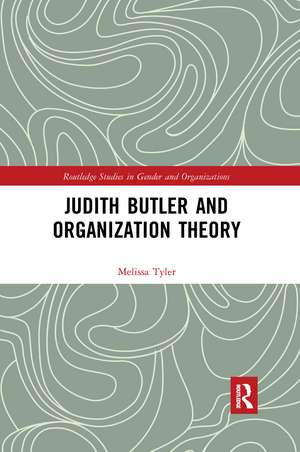Judith Butler and Organization Theory: Routledge Studies in Gender and Organizations
Autor Melissa Tyleren Limba Engleză Paperback – 31 mar 2021
Judith Butler and Organization Theory makes a substantial contribution to the analysis of gender, work and organization. It not only covers central issues in Butler’s work, it also offers a close reading of the complexities and nuances in her thought. It does so by ‘reading’ Butler as a theorist of organization, whose work resonates with scholars, practitioners and activists concerned to understand and engage with organizational life, organization and organizing. Drawing from a range of illustrative examples, the book examines key texts or ‘moments’ in the development of Butler’s writing to date, positing her as a thinker concerned to understand and address the ways in which our most basic desire for recognition comes to be organized within the context of contemporary labour markets and workplaces. It examines insights from Butler’s work, and the philosophical ideas she draws on, considering the impact of these on work, organization and management studies thus far; it also explores some of the many ways in which her thinking might be mobilized in future, considering what scope there is for a non-violent ethics of organization, and for a (re)assembling of the relationship between vulnerability and resistance within and through organizational politics.
| Toate formatele și edițiile | Preț | Express |
|---|---|---|
| Paperback (1) | 385.04 lei 43-57 zile | |
| Taylor & Francis – 31 mar 2021 | 385.04 lei 43-57 zile | |
| Hardback (1) | 999.74 lei 43-57 zile | |
| Taylor & Francis – 4 oct 2019 | 999.74 lei 43-57 zile |
Preț: 385.04 lei
Nou
Puncte Express: 578
Preț estimativ în valută:
73.70€ • 75.95$ • 62.22£
73.70€ • 75.95$ • 62.22£
Carte tipărită la comandă
Livrare economică 03-17 martie
Preluare comenzi: 021 569.72.76
Specificații
ISBN-13: 9780367747473
ISBN-10: 0367747472
Pagini: 232
Dimensiuni: 152 x 229 x 12 mm
Greutate: 0.34 kg
Ediția:1
Editura: Taylor & Francis
Colecția Routledge
Seria Routledge Studies in Gender and Organizations
Locul publicării:Oxford, United Kingdom
ISBN-10: 0367747472
Pagini: 232
Dimensiuni: 152 x 229 x 12 mm
Greutate: 0.34 kg
Ediția:1
Editura: Taylor & Francis
Colecția Routledge
Seria Routledge Studies in Gender and Organizations
Locul publicării:Oxford, United Kingdom
Public țintă
PostgraduateCuprins
Preface
Introduction
1) Making trouble: Organizational performativity and parody
2) The organizational ‘matter’ of bodies at work
3) Un/doing organization - Coherence at the cost of complexity
4) Accounting for/in organization: Giving and working an account of one’s self
5) Organized dispossession: The organizational politics of precarity
6) Organizational (re)assemblage: Towards a plural performativity
Postscript - Organizing a/as non-violent ethics and politics
References
Introduction
1) Making trouble: Organizational performativity and parody
2) The organizational ‘matter’ of bodies at work
3) Un/doing organization - Coherence at the cost of complexity
4) Accounting for/in organization: Giving and working an account of one’s self
5) Organized dispossession: The organizational politics of precarity
6) Organizational (re)assemblage: Towards a plural performativity
Postscript - Organizing a/as non-violent ethics and politics
References
Notă biografică
Melissa Tyler is a Professor of Work and Organization Studies at Essex Business School, The University of Essex, UK.
Descriere
Judith Butler and Organization Theory makes a substantial contribution to the analysis of gender, work and organization. It not only covers central issues in Butler’s work, it also offers a close reading of the complexities and nuances in her thought.







